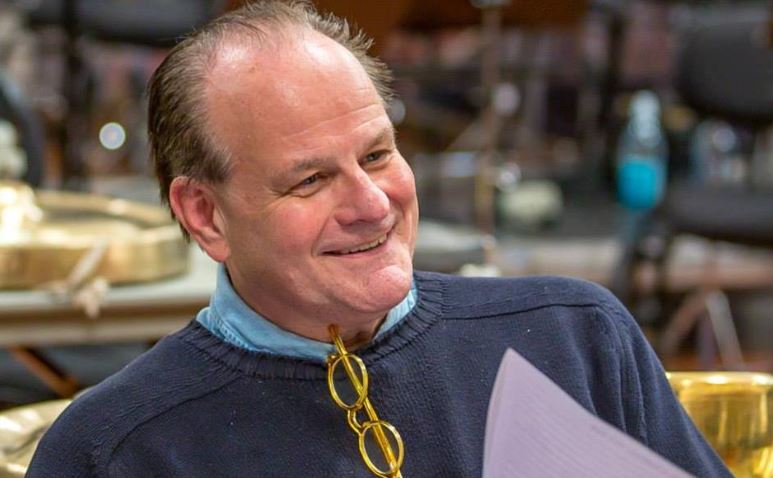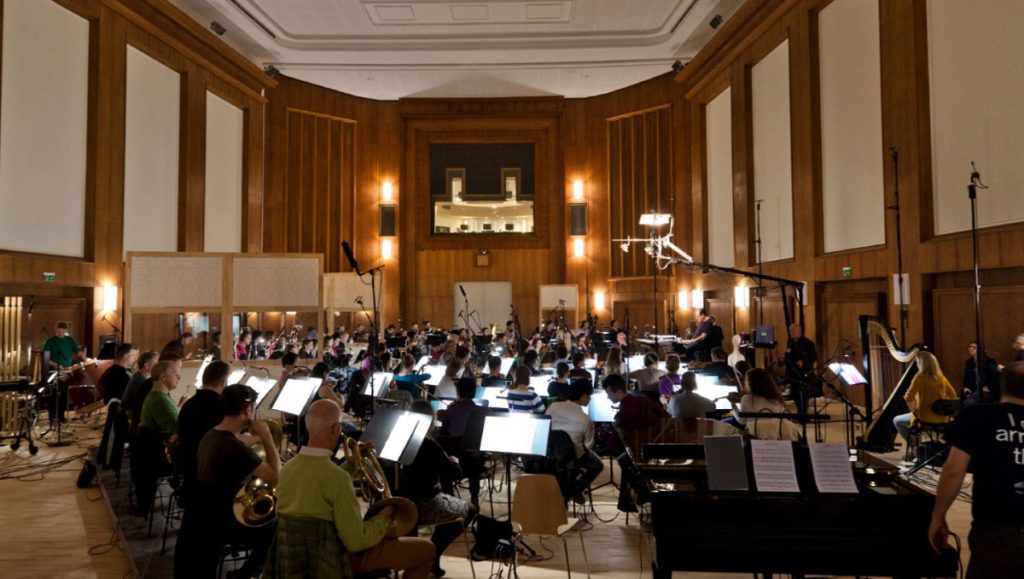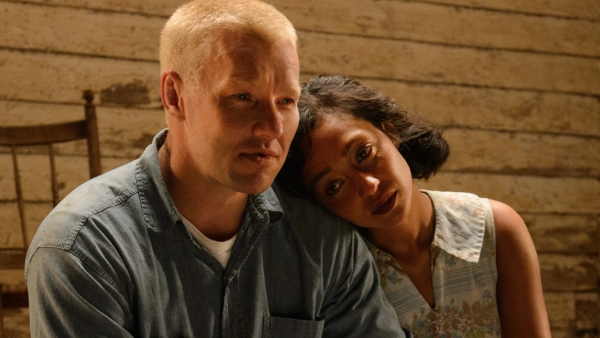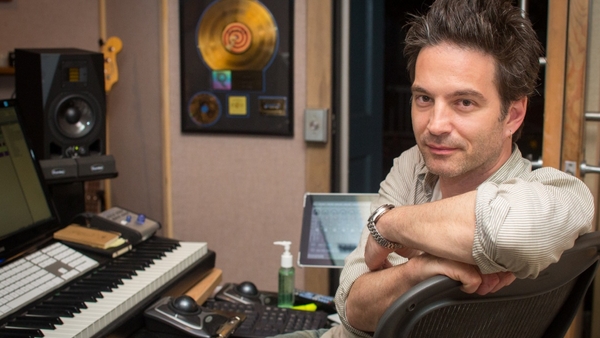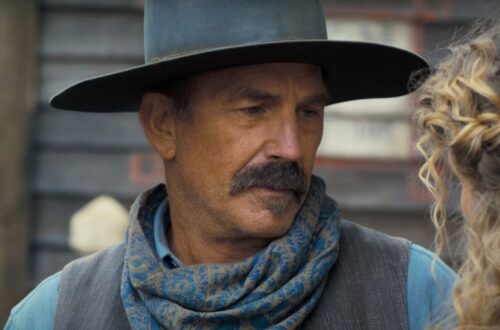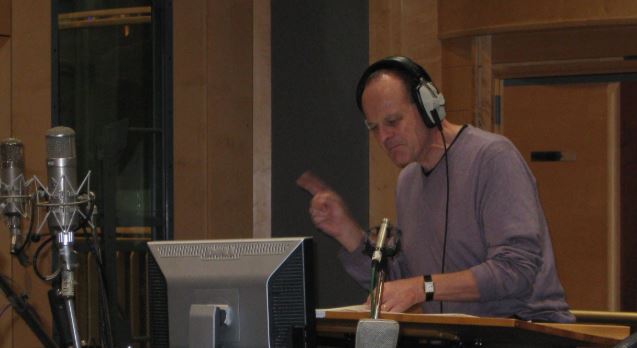 In the span of 30 years, composer/orchestrator Conrad Pope has worked on more than 420 films. We spent an hour with Pope, and he is an infectious joy as well as one of the most laid-back people you’d ever meet. But he’s also a legend. Name any film or topic, and you’ll sit there in awe of the stories he could tell. I sure did.
In the span of 30 years, composer/orchestrator Conrad Pope has worked on more than 420 films. We spent an hour with Pope, and he is an infectious joy as well as one of the most laid-back people you’d ever meet. But he’s also a legend. Name any film or topic, and you’ll sit there in awe of the stories he could tell. I sure did.
It’s been said that Pope is the best kept secret in film music – if there’s a successful score, it’s because Conrad Pope is attached to it. He will quickly and humbly shoot that down, but as his mentor used to say, “It’s always amazing how good my work is when I work for a good composer.”
Pope has a gift for minutia, and when it comes to orchestration, he is the MacGyver of music. He tells us that a good composer is one who writes understanding the expressive potential that lies not only in the nature of the instrument, but in the nature of the instrumentalist who has mastered that instrument.
A wealth of experience, knowledge, advice, his simplest words of wisdom are from his good friend John Williams. It’s nothing technical, like don’t put the bass on with the trombone. But it’s an old Greek expression: Character is Destiny. If you want to write great music, work on your character. Like Williams, Pope is dedicated to the art, not the gig.
GoSeeTalk: If you’re not in the music business, an “orchestrator” is a pretty nebulous term. How do you describe your job and the role you play, and what is the need for an orchestrator?
Conrad Pope: I’ll quote my mentor, Arthur Morton, who was Jerry Goldsmith’s orchestrator. He told me that, “In the beginning, Jerry had a lot to learn. And today, I learn a lot from him.” That was the progression of what it used to be back in the day. An orchestrator is someone who helps the composer make his music the best is can be.
The deadlines are so crushing at times, and so much music has to be produced that the orchestrator can be, in some cases, a back stop.
Depending on the composer, you could help figure out if you need two clarinets on a cue, or just one. You’re basically just an editor, because that, in John Williams’ case, is all that’s needed. You just need to help get things from the short score to the long score.
Other composers need more help. They may be good with a theme but not good with harmony. Or they might be someone who writes great piano music but doesn’t know the orchestra. That’s less the case today because of mock ups and synthesizes.
When I first got started, you were hired because you could do various styles – that could be anything from source music or ghostwriting. 30 years ago that was the role was pretty much a handyman type job. You would go from being a copyist for a single composer to having to work with a team of composers who are working to produce a score for a “lead composer”.
Hollywood Music Workshop has grown in the amount of days over the years, so how has film appreciation helped expand the workshop and what interests you most about being part of this?
People have always claimed that music is the universal language. And I’ve always thought, no, it’s not. There’s a vast difference between the music of India, and Western Europe, and jazz. Different cultures have distinct takeaways on how music functions as an art form.
How people feel the music is the universal language really comes down to how they experience it in films and all of them seem to be able to speak John Williams. [Laughs] I am intrigued how people view, and work within that universal rhetoric.
People from cultures around the globe seem to respond well to Morricone and Williams and Horner. But I also went to school in Germany. So when Dimitrie Leivici came and asked me if I’d be part of this, I was very happy to partake. I tell people I’m not a teacher, but I know a lot of things. [Laughs] I try to give the kids a taste of what things were back in the ‘30s. Back when I was starting out, I had to know lots of styles, I had know big band and folk, you name it, I had to be adaptable.
But that’s not so necessary today, because we license everything. No one has to do a sound alike. But you do have to be able to know how things were done back then, and how they are done today, and for instance, know that we record the brass separately from the strings, but also why we do that, how to fix the orchestration, and what composers might be looking for. But, above all, I really impress upon them the need for them to know the instrument, and show that you know how to write for their instrument.
What’s the bigger thrill: Is it engaging students and helping them grow, or being on stage with the symphony?
Well, I have to say that working with the kids is amazing, but as an orchestrator it’s really inspiring to have the symphony play the films that I had a hand in writing out, so to speak, and shaping the performance. Plus, I know
all the music. Doing My Fair Lady and The Music Man and A.I. is just incredible.
With the institute, times are changing, and computers are changing music, and it’s enabled a lot of people who before might have been barred from being composers to now be composers. I think there will be a big burst of creativity.
Vocal music was one thing, but then once instruments were developed it got a lot fancier, and our idea of what a musical phrase was changed and so the way we made music changed. I think the same thing is happening with computers and it reminds me of something a friend of mine told me twenty years ago. He said, “Conrad, we’re not in the music business, we’re in the recording business.” That part is highly technical and I want the kids to know that, too.
There are a lot of self-taught YouTube musicians out there. But it seems like fortune favors those who just get themselves out there, and more so if you can’t attend a fine arts school. Is your advice different to people who have different backgrounds? Those who know technique inside and out, and those who put finished elements together. It’s kind of like a scratch kitchen versus a finishing kitchen?
In the old days, one used to think of creation as willing something into existence. Today, it’s the assembly of pre-packaged elements. Think of Garage Band: it suggests creative choices and you can choose different options. The process of selecting this over that can yield an amazing composition.
But those who use it might not understand why the parts make the whole. I think it will sort itself out because a person can insert their own personality into something even if they’re just constructing some of these bits. It
almost ties back to something we used to say in jazz circles, “Imitate, assimilate, innovate.” I just try to guide and help them find out who they are inside. This is a creative endeavor, but I want them to know that this is all knowable. [Laughs]
I went to public schools, because I knew I wanted to be a composer, between elementary school and high school, I played one instrument out of every group. My major instrument is piano, but I played bassoon, baratone saxophone, trombone, and violin.
I knew that I wanted to be versed in all the instruments, and that’s what musicians used to do. Knowing the capabilities of certain instruments has helped tremendously. This is a very tough business, and nothing you learn is never not going to be of some help.
Orchestrating for a film, and the beats of the narrative are one thing. But how do you arrange the end credits? It seems easy enough – create a suite of themes that fit the 5 to 10 mins – but some composers showcase expanded and new material in the credits. How many different methods are there?
End credits used to be great back in the day. Williams’ Home Alone is my favorite that comes to mind. John used to always write the end credits cue because he knew that was the place where he could just uncork. You don’t have to worry about someone talking, so you have more freedom.
That was the dessert for the composer and the place where the music can express itself. Then things got compressed and conversations sprung up like, “what can we ProTool together?” Now, no one wants to write end credits anymore. But even so, the composer still dictates the sequence of things.
I worked on The Rocketeer with James Horner, and there’s a love theme throughout he film, but you only hear two bars of it. In the end credits, you get the whole thing. That’s the place where James could get the original tune he wrote into the picture.
That was the first big film you ever worked on, right?
Yes. Prior to that I had worked on space junk, but I was so excited at the thought of working with James because he is one of the great film composers. The last time I really cried at the cinema was because of James’ music. He was truly an emotional composer. And I believe he had this uncanny feel for the rhythm of film, the rhythm of music, and how they fit together.
The Rocketeer was one of the great film scores, and I was in heaven. It was a lot of work, [Laughs] but I was in heaven. He was a tough guy, and he was a genius, and I was very saddened when he killed himself basically.
It was the most meaningless death of recent times as far as I’m concerned. It’s also a cautionary tale of Hollywood – don’t get so successful that people don’t tell you no. If you’re over 50 years old don’t get in a plane and start doing loop the loops. But there were a lot of signs about James that people didn’t really know. He was a spelunker going down deep in the caves, and he was secret adventurer. That, and he loved e toys and robots. They recently released a photo of his studio, and it looks like something out of the end of Blade Runner.
But it really was one of the great thrills of my life to be associated with him and have learned from him. After John, he’s probably had the greatest influence on my life.
Funny thing about The Rocketeer, it reinforces the fact that it’s better to write a mediocre score to a great movie
than it is to write a genius score to movie that just didn’t ignite. When I first got on The Rocketeer and they said it’s about a guy who has a rocket pack and flies, I thought that sounded stupid. But by the end of it it’s almost like Stockholm syndrome, and it had me going, “This is the greatest motion picture that’s ever been made. Surely, The Terminator can’t do anything to stop the march of The Rocketeer taking over the world because it’s got the greatest score ever written!” [Laughs] But it didn’t turn out that way, it was a big flop.
Well, I’ve loved it since it was released, and it’s mainly because of Horner’s work. But it has gained quite an audience over time. Like Big Trouble in Little China, it has proved its worth.
Yes, they are both heartfelt and genuine and that is something that’s always going to win out in the end. Just like Rise of the Guardians.
You’ve got to work on personal favorite scores of mine, like The Matrix Reloaded, Life of Pi, and done lots of great work on numerous Alexandre Deplat scores including Rise of the Guardians and Valerian and the City of a Thousand Planets. They are so non-conventional. How do you approach something that’s highly textural, or worldly, or something with weird effects?
That’s what’s exciting about this business. Each film is different, and each has its own challenges. On Life of Pi, I did some very big sequences, but Mychael Dana is such a unique film composer and has such a distinctive voice and distinctive approach.
What you have to do is listen to them, and have a good ear, not just musically, but to listen to the composer and sense and understand what they need. Valerian was a particular trip because it was Alexandre Desplat I action mode – it was just exciting to hear what he had come up with, because this is what he would’ve had in Rogue One had he scored that. [Laughs] But that movie and it’s score are unique because Alexandre put his own spin on it.
Very few people play a nyckelharpa or a marxophone, and you don’t tend to hear saxophone in film scores or modern music these days. Styles change with the times, but whether it’s a period-piece or a futuristic story, whatever you write should be tailored the narrative in an indigenous way, even if the audience may not be familiar with certain types of instruments, right?
Very true. Take, for instance, Alexandre’s last film score. For Isle of Dogs, speaking specifically about saxophone, we used four saxophones, including a bass sax, and it was really heterophonous, to use the phrase from Stravinsky, which is when the elements don’t blend. We also used recorders and a men’s chorus, along with the saxophones.
And then there were the Taiko drums which makes it indigenous. Wes was very insistent on using a real Taiko ensemble. He’s very big on handmade stuff. We, at times had four to five drummers set up. Alexandre always has a great year for keen ear for color and unique instruments. He’s got a unique palette and he is always seeking that out and adding instrumental color.
Thanks to Conrad for his time, and his publicist for arranging this interview. For more information on the workshop and concert event, click here to head to the official site for Hollywood Music Workshop. You can also watch the video to get an idea of what to expect at the academy, and hear Pope personally discuss the Workshop.
